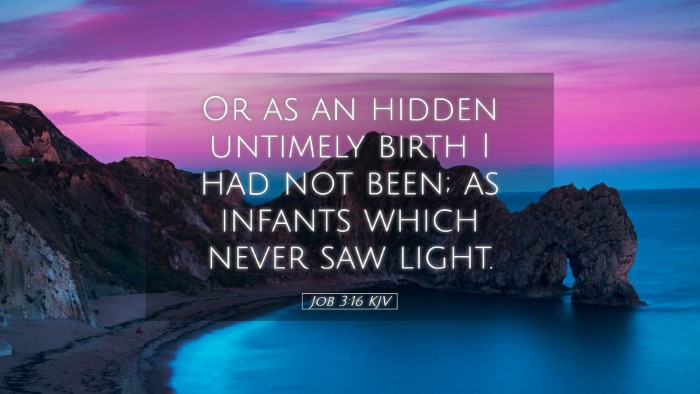Old Testament
Genesis Exodus Leviticus Numbers Deuteronomy Joshua Judges Ruth 1 Samuel 2 Samuel 1 Kings 2 Kings 1 Chronicles 2 Chronicles Ezra Nehemiah Esther Job Psalms Proverbs Ecclesiastes Song of Solomon Isaiah Jeremiah Lamentations Ezekiel Daniel Hosea Joel Amos Obadiah Jonah Micah Nahum Habakkuk Zephaniah Haggai Zechariah MalachiJob 3:16
Job 3:16 KJV
Or as an hidden untimely birth I had not been; as infants which never saw light.
Job 3:16 Bible Commentary
Commentary on Job 3:16
Verse Text: “Or as an hidden untimely birth I had not been; as infants which never saw light.” (Job 3:16)
Introduction
The Book of Job presents a profound exploration of suffering, loss, and the human condition. In Job 3:16, the protagonist expresses his deep anguish and reflects on the value of life in the face of unbearable misery. This commentary synthesizes insights from esteemed public domain scholars, including Matthew Henry, Albert Barnes, and Adam Clarke, to provide a comprehensive analysis of this poignant verse.
Contextual Overview
Job’s lament occurs in the initial chapters of the book, following his catastrophic losses—his wealth, health, and family. It is crucial to understand that Job is not merely bemoaning his fate but grappling with existential questions about life and suffering. His reflections are sparked by the overwhelming pain that accompanies his mourning.
Historical and Cultural Background
The culture of Job's time placed significant value on progeny and prosperity, which makes his extreme misfortune even more poignant. In the ancient Near East, childlessness was often regarded as a curse. Thus, when Job likens his plight to that of a hidden, untimely birth, he elucidates a profound sense of despair.
Thematic Analysis
- The Value of Life: Job emphasizes a paradox regarding existence; he questions whether his life—filled with pain—was a gift or a burden.
- Existential Reflection: His thoughts lead to a consideration of non-existence as a form of potential relief from suffering, reflecting a deep exploration of the meaning of life.
- Formation of Identity: Job’s identity becomes intricately tied to his suffering, as he defines his humanity in the context of his undesired existence.
Insights from Matthew Henry
Matthew Henry observes that Job’s statement reflects a profound sense of loss and disillusionment with life. He emphasizes how Job’s comparison to a “hidden untimely birth” signifies not just non-existence, but an existence filled with regret and sorrow.
Henry further elaborates that Job’s lamentation expresses a yearning for the peace that comes with non-being, suggesting that he perceived his life as a “burden” rather than a blessing. This highlights his mental state—tortured by grief and browsed with feelings of futility.
Insights from Albert Barnes
Albert Barnes interprets this verse as a stark illustration of despair. He points out that Job’s rhetorical question about the value of life communicates a significant theological and philosophical inquiry. Barnes suggests that Job’s lament reveals a contemplation of God’s providence and the apparent absence of divine justice in human suffering.
According to Barnes, Job’s reflections provoke critical questions about life’s worth and challenges theological narratives surrounding suffering and righteousness. In challenging the assumed divine order, Job embodies a struggle familiar to many believers facing anguish.
Insights from Adam Clarke
Adam Clarke offers a perspective that highlights the emotional depth behind Job’s words, stating that the hiding of an untimely birth symbolizes the senselessness of suffering. Clarke emphasizes that the phrase “infants which never saw light” implies that life can be a source of suffering even from its inception.
Clarke expands on the notion that Job’s desire for non-existence signifies an overwhelming sense of hopelessness that transcends personal grief and touches upon universal human suffering. His commentary invites readers to confront the uncomfortable reality of anguish and existential questioning.
Theological Implications
This verse raises critical theological inquiries about suffering, divine purpose, and the nature of existence. Job’s lament opens the door for discussions regarding theodicy—the justification of God in the face of evil and suffering. It challenges believers to reflect on God’s nature and the human experience of pain.
Reflections for Pastors and Theologians
Pasting this verse into sermons or theological discussions offers an opportunity to engage congregants in a dialogue about suffering and hope. It serves as a chance to affirm the complexities of faith amid trials and to provide pastoral care that acknowledges the reality of despair while pointing towards hope and redemption.
Conclusion
Job 3:16 serves as a profound reflection on the nature of suffering, identity, and the human experience. Drawing on insights from esteemed commentaries, it invites a deep exploration of life's value, the pursuit of meaning, and the bedrock of faith in the face of despair. As pastors, students, and scholars delve into this verse, they are reminded of the need to confront the realities of suffering while nurturing a resilient hope rooted in faith.


